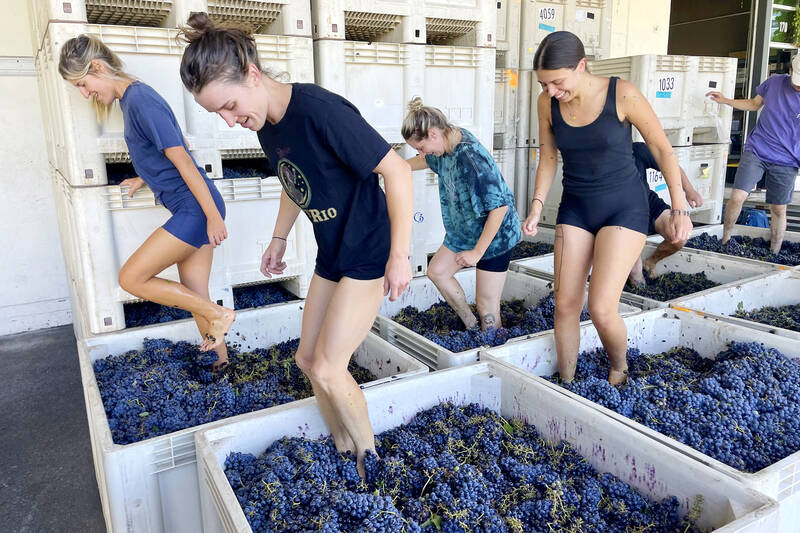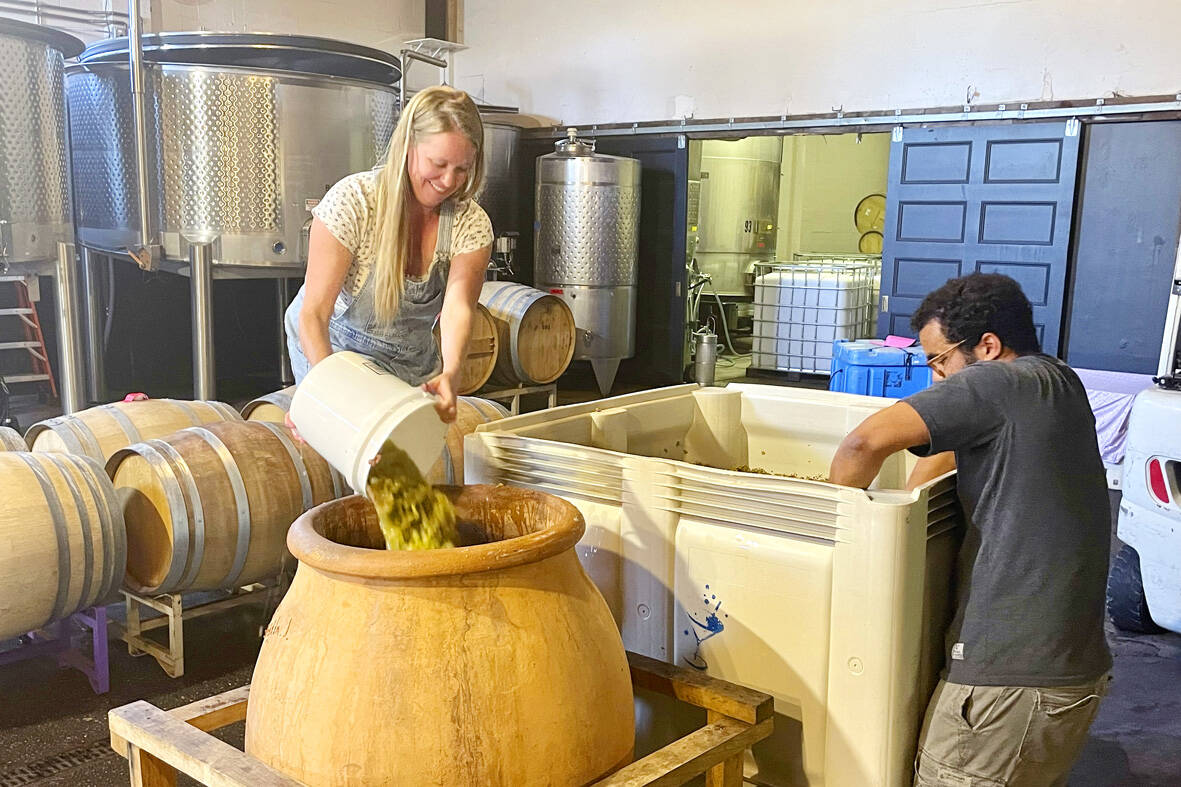Wine made in ancient ways is gaining new fans.
Natural wine — which emphasizes sustainability and minimal processing — is seeing growing interest in the US even though overall wine consumption has been declining since 2015, according to IWSR Drinks Market Analysis, a research firm. While natural and other sustainable wines made up less than 1 percent of sales in 2021, demand was rising faster than the wine category as a whole, according to alcohol delivery site Drizly.
Generally, natural wine is made with hand-picked organic grapes that haven’t been sprayed with herbicides or pesticides. Once they’re crushed — sometimes by foot, the way they were crushed by ancient Romans — they are naturally fermented with no added water, yeast or other ingredients. Some natural winemakers add sulfites, a chemical found naturally in grapes, as a preservative; others don’t. Some filter their wines; others leave them cloudy and full of sediment.

Photo: AP
The result is wines that are earthy, savory and less predictable than many of the wines churned out by big producers.
“The first time you taste it, you can tell it’s alive,” said John Keller, owner and winemaker at Neu Cellars in Northern Michigan.
OVERCOMING HURDLES

Photo: AP
But natural wine needs to overcome some hurdles that may be hampering its growth. Unlike organic wine — which must be government certified — natural wine has no set definition in the US It’s not easy to find, since most natural wines don’t have the word “natural” on their labels.
“Natural just sounds good, but conventional wine is pretty natural too,” said Anita Oberholster, a professor in the Department of Viticulture and Enology at the University of California, Davis. “If the idea of natural wine is going to grow, we should do research on it and define it.”
Keller, who has a degree in biochemistry, started out working for a big winemaker in California. But he was disillusioned by all the chemical manipulation that went into making each bottle consistent. There are dozens of additives regularly used in the wine industry, including gelatin, oak dust and egg whites.
In 2019, Keller and his father opened Neu Cellars to focus on making natural wines. Last year, they produced 3,000 bottles.
Natural winemaking is “100 percent scary,” Keller said. He only gets to practice once a year and he can’t fall back on additives if things go wrong.
“It’s how life happens. You can’t really control it. You just have to give it the best conditions for the best outcome you can get,” he said.
Natural wine is not so much a fad as a return to tradition, said Erin Coburn, the owner of Minimo, a natural wine bar in Oakland, California. In some countries, like Georgia, winemakers never stopped making natural wine; they still ferment grapes in the egg-shaped clay pots they’ve used for thousands of years.
But others say the line between natural and conventional wines is a very thin one, especially for higher-end wines made with good grapes.
Many additives like yeast — which aids fermentation — are natural substances that are found in vineyards already, Oberholster said. And many conventional wines are made without additives.
INDUSTRY STANDARDS
Some in the industry would like to see standards adopted for natural wine. That’s what happened in France, where the wine industry approved the “vin method nature” label and certification process in 2020. More than 430 vintages have used the label since then, according to the Union for the Defense of Natural Wines.
Brian Gelb, the vice president of wine for Total Wine, a retail chain with 257 US stores, has been adding natural wines to store shelves in the last two years to meet growing demand. But he isn’t sure how much of Total Wine’s inventory was already considered “natural.”
“I would just like to have a consistent set of terms and phrases that can be universally understood,” Gelb said.
Anthony Zhang, the co-founder and CEO of Vinovest, a wine investment company, said some wine brands are taking advantage of the lack of standards and using natural imagery without being transparent about how they define “natural.”
That can mislead consumers, who generally pay more for natural wines because they are made by smaller producers. Absentee Red, a natural California red blend, costs around US$26 per bottle. Vivino, an online wine merchant, says similar bottles of conventional wine start around US$14.
Still, winemakers don’t always welcome standards, which come with significant costs and rules. Keller uses organic grapes but says he can’t justify the cost of repeated inspections for an organic label.
Cheryl Stanley, a senior lecturer of food and beverage management at Cornell University, said standardization would be a challenge since there are so many perceptions of what makes wine “natural.” She questions if any wine is truly natural; after all, there is human intervention at every step, from how grapes are trellised to the date they are harvested.
Greater transparency on wine labels could be coming soon. Starting in December, wines sold in the European Union will have to carry ingredient labels and nutrition information. Oberholster expects the US to adopt ingredient labels in the next few years as well, which would make it easier to see which wines were made without additives.
Pax Mahle, the proprietor and winemaker at Pax Wine Cellars in Sebastapol, California, is devoted to natural winemaking; he even crushes his grapes by foot. But he wants the freedom to add a little sugar or acid or sulfur to those grapes if he needs to, and he filters some of his white wines to make them taste cleaner and fresher.
“I think that the natural wine movement was never about these absolutes,” Mahle said. “I don’t fall into this belief that if you add sulfur you’re kicked out of the clubhouse. I think you should be kicked out of the clubhouse for making bad wine.”

On April 26, The Lancet published a letter from two doctors at Taichung-based China Medical University Hospital (CMUH) warning that “Taiwan’s Health Care System is on the Brink of Collapse.” The authors said that “Years of policy inaction and mismanagement of resources have led to the National Health Insurance system operating under unsustainable conditions.” The pushback was immediate. Errors in the paper were quickly identified and publicized, to discredit the authors (the hospital apologized). CNA reported that CMUH said the letter described Taiwan in 2021 as having 62 nurses per 10,000 people, when the correct number was 78 nurses per 10,000

As we live longer, our risk of cognitive impairment is increasing. How can we delay the onset of symptoms? Do we have to give up every indulgence or can small changes make a difference? We asked neurologists for tips on how to keep our brains healthy for life. TAKE CARE OF YOUR HEALTH “All of the sensible things that apply to bodily health apply to brain health,” says Suzanne O’Sullivan, a consultant in neurology at the National Hospital for Neurology and Neurosurgery in London, and the author of The Age of Diagnosis. “When you’re 20, you can get away with absolute

May 5 to May 11 What started out as friction between Taiwanese students at Taichung First High School and a Japanese head cook escalated dramatically over the first two weeks of May 1927. It began on April 30 when the cook’s wife knew that lotus starch used in that night’s dinner had rat feces in it, but failed to inform staff until the meal was already prepared. The students believed that her silence was intentional, and filed a complaint. The school’s Japanese administrators sided with the cook’s family, dismissing the students as troublemakers and clamping down on their freedoms — with

As Donald Trump’s executive order in March led to the shuttering of Voice of America (VOA) — the global broadcaster whose roots date back to the fight against Nazi propaganda — he quickly attracted support from figures not used to aligning themselves with any US administration. Trump had ordered the US Agency for Global Media, the federal agency that funds VOA and other groups promoting independent journalism overseas, to be “eliminated to the maximum extent consistent with applicable law.” The decision suddenly halted programming in 49 languages to more than 425 million people. In Moscow, Margarita Simonyan, the hardline editor-in-chief of the